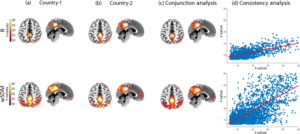Weighted Symbolic Dependence Measure (wSDM) for fMRI resting-state connectivity analysis: A multicentric validation for frontotemporal dementia
Scientific Reports
Moguilner, S., García, A. M., Mikulan, E., Hesse, E., García-Cordero, I., Melloni, M., Cervetto, S., Serrano, C., Herrera, E., Reyes, P., Matallana, D., Manes, F., Ibáñez, A. & Sedeño, L. (2018). Weighted Symbolic Dependence Measure (wSDM) for fMRI resting-state connectivity analysis: A multicentric validation for frontotemporal dementia. Scientific Reports 8, 11181. Online: https://go.nature.com/2uV9GlV.
En este estudio desarrollamos una medida (wSDM, por su voz en inglés Weighted Symbolic Dependence Metric) para caracterizar aspectos complejos de la conectividad cerebral con datos de resonancia magnética. Mediante sofisticados métodos de análisis, mostramos que nuestra medida permite identificar pacientes con demencia frontotemporal con mayor precisión que otras métricas clásicas y más sencillas. Estos resultados fueron para participantes evaluados en dos países distintos, mostrando el potencial de nuestros hallazgos para ser generalizados a nuevas muestras de pacientes. Este estudio mostró la robustez de nuestra medida para el estudio de la conectividad cerebral, y para identificar alteraciones que sean marcadores sensibles de la variante conductual de la demencia frontotemporal.
Para acceder al artículo hacé click AQUÍ
Weighted Symbolic Dependence Measure (wSDM) for fMRI resting-state connectivity analysis: A multicentric validation for frontotemporal dementia
Scientific Reports
Moguilner, S., García, A. M., Mikulan, E., Hesse, E., García-Cordero, I., Melloni, M., Cervetto, S., Serrano, C., Herrera, E., Reyes, P., Matallana, D., Manes, F., Ibáñez, A. & Sedeño, L. (2018). Weighted Symbolic Dependence Measure (wSDM) for fMRI resting-state connectivity analysis: A multicentric validation for frontotemporal dementia. Scientific Reports 8, 11181. Online: https://go.nature.com/2uV9GlV.
The search for biomarkers of neurodegenerative diseases via fMRI functional connectivity (FC) research has yielded inconsistent results. Yet, most FC studies are blind to non-linear brain dynamics. To circumvent this limitation, we developed a “weighted Symbolic Dependence Metric” (wSDM) measure. Using symbolic transforms, we factor in local and global temporal features of the BOLD signal to weigh a robust copula-based dependence measure by symbolic similarity, capturing both linear and non-linear associations. We compared this measure with a linear connectivity metric (Pearson’s R) in its capacity to identify patients with behavioral variant frontotemporal dementia (bvFTD) and controls based on resting-state data. We recruited participants from two international centers with different MRI recordings to assess the consistency of our measure across heterogeneous conditions. First, a seed-analysis comparison of the salience network (a specific target of bvFTD) and the default-mode network (as a complementary control) between patients and controls showed that wSDM yields better identification of resting-state networks. Moreover, machine learning analysis revealed that wSDM yielded higher classification accuracy. These results were consistent across centers, highlighting their robustness despite heterogeneous conditions. Our findings underscore the potential of wSDM to assess fMRI-derived FC data, and to identify sensitive biomarkers in bvFTD.
To access the full paper please click here



